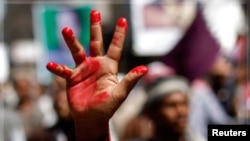Violence continues to rock the impoverished Gulf state of Yemen.
For the past ten months a popular uprising seeking to oust President Ali Abdullah Saleh has been underway in Yemen. Pro-Saleh forces regularly engage in deadly clashes with armed tribesmen and military defectors who support the protesters in Yemen's largest cities. In the south, al-Qaida-linked militants have occasionally taken control of entire towns. The many months of violence have forced more than 80,000 residents of Zinjibar to flee to neighboring provinces.
According to the Yemen Observatory for Human Rights, about 400 people have been killed since the protests that began in February, although group spokesman al-Jalil Waddah said the numbers of those killed in the south and Arhab region could be much higher. He added that his organization has documented many cases of political prisoners alleging abuse at the hands of government security forces in Sana'a and the country's second largest city, Taiz.
The United States is deeply troubled by reports of attacks against civilians in Yemen. The U.S. condemns violence by all parties and calls for all sides to exercise maximum restraint.
President Saleh's refusal to transfer power has further destabilized Yemen, denying the country the opportunity to restore peace and ultimately elect a new government. Economic conditions also continue to deteriorate under the pressure of growing protests and increasing division throughout Yemen. Widespread inflation, including rising commodity prices, affects every Yemeni. International and domestic investors are deterred from investing or expanding their operations in Yemen due to a deteriorating security situation. Ongoing political instability and uncertainty over the status of Yemen’s leadership have also undermined expected reforms related to responsible economic management, anticorruption efforts, taxation, and subsidy reduction.
If President Saleh cares about Yemen's future and the well-being of the Yemeni people, he must immediately initiate a full transfer of power that allows early presidential elections to be held within the framework of the Gulf cooperation Council transition initiative. The U.S. calls on him to fulfill his promises without delay. Only then can the Yemeni people come together to address the enormous challenges facing their country.
Time For Transition In Yemen

Violence continues to rock the impoverished Gulf state of Yemen.



